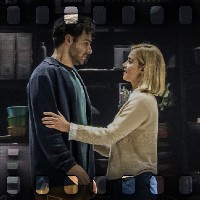In the now-familiar style popularised by Constellations, we get a series of short scenes between the pair, with quick flashes of light (lighting designed by Aideen Malone) taking us backwards and forwards in time.
So we open with the couple trying to have a conversation with the limited amount of words that are left to them at the end of the day, before jumping back to a time before the ban, when it's just a possibility and Oliver, a musician and social activist from a wealthy background, is involved in protests against it. Bernadette, who grew up working class but is now the main earner as a divorce lawyer, is confident it'll never pass and has largely dismissed the possibility. Having been written before the Brexit vote, it's interesting how much this divide between those taking the right-wing threat seriously and those dismissing it as an absurdity now feels familiar.
Steiner comes up with a lot of areas that his high concept can explore: Obviously there's the issue of communication between two people, and the contrast between the way they have to pare down their feelings and intentions in the post-ban scenes, and the way they still can't necessarily find the right words to communicate even when they have unlimited ones to choose from. But increasingly the theme becomes a wider political one, as Oliver quickly identifies the word ban as a fascist tool to suppress dissent, protest and the sharing of ideas, and to make sure those already in power are the ones to keep it. Sure enough, when exceptions to the law are mooted to allow free speech for political protest, MPs reject them, but co-opt them to make themselves exempt. With the right to protest constantly under threat in real life, the topicality of why the play has been revived now is easy to see.
My main problem with the play is that for all that it brings up a lot of diverse aspects its premise suggests, it's pretty much done so in the first half-hour, and the remaining two-thirds of the play circle around the same ideas. Lemons Lemons Lemons Lemons Lemons became a fringe hit, and maybe this didn't matter so much when the audience could feel immersed in the characters' lives, but from the Balcony of a West End theatre Coleman and Turner, who are both charming and have great chemistry, have to rely on that because there's not a lot to root for in the characters themselves. The trouble is that, apart from a flashback to their first meet-cute at a cat funeral, we pretty much only see Bernadette and Oliver at times of stress - if not discussing how to stop the ban, or confined by it once it's passed, they're circling around Bernadette's worries about how close he is to his ex. We never see them relaxed and happy as a couple, which makes it hard to know if their relationship is worth fighting for, and although there's a few funny lines Rourke's production is a pretty bleak evening overall.
And while the premise invites a lot of suspension of disbelief, a detached view does raise a lot of questions about it. There's a brief mention of the difficulty of children learning to speak (presumably they'd learn English from TV & films made before the ban) but it was something my mind kept coming back to. There appears to be no exemption for journalists to write or newsreaders to speak, so it's surprising that it's never mentioned, in the political arguments, that it also essentially amounts to a news blackout. Tapping out Morse code appears to be a loophole, but Penny pointed out it was odd that sign language was never mooted as an option. I did like some of the details like Bernadette needing to gag herself at night because she talks in her sleep and might use up her entire quota. Lemons Lemons Lemons Lemons Lemons was Steiner's first play, and his later You Stupid Darkness! shows him living up to his promise, but putting this one under a spotlight has exposed how it doesn't quite hold together, or convince that its premise stretches to 90 minutes.
Lemons Lemons Lemons Lemons Lemons by Sam Steiner is booking until the 18th of March at the Harold Pinter Theatre; then touring to Manchester and Brighton.
Running time: 1 hour 30 minutes straight through.
Photo credit: Johan Persson.





No comments:
Post a Comment